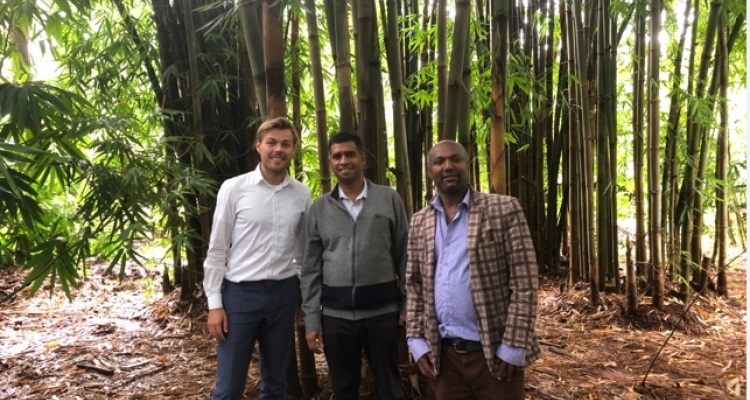
Alumnus testimonial
Gersom - Policy Adviser on Climate and Forests
During his Master’s Environmental Sciences, Gersom specialised in Environmental Policy and joined the Sustainable Development Diplomacy track where he learned about the interdisciplinary nature of the programme. He acquired negotiation skills as well as extensive experience in the field of policies regarding sustainable management of natural resources.
My master's in Environmental Sciences added an interdisciplinary perspective that enabled me to grasp technical environmental issues and solutions more easily.
Could you please tell us a bit about yourself?
"My name is Gersom, I started with the bachelor's International Development Studies in 2013. Already during my first year, I began exploring other courses that I found interesting, for instance concerning forest and nature conservation. During my second year, I became more interested in the economy and followed a few extra courses in that direction.
Within my bachelor's, I choose the major Economics of Development and a minor at the Norwegian University of Life Sciences with courses like Climate Economics and the Political Economy of the Environment."
How did you arrange your Master's studies to fit your interests?
"After finalising my bachelor's I decided to do a master's in Environmental Sciences with a specialisation in Environmental Policy. Also, I joined the Sustainable Development Diplomacy track.
In hindsight, one thing I value most is the interdisciplinary character of my master's programme. While I am more of a ‘gamma’ I learned a lot from collaborating with ‘beta’s’. The second thing is that most of my elected courses contained a ‘negotiation’ component at which we trained our negotiation skills by imitating settings in the international (environmental) political arena, such as climate negotiations.
The choices I made concerning my master's thesis and internship have brought me where I am currently. For my master's thesis, I went to Indonesia to participate in the research of the Center for International Forestry (CIFOR) regarding the policies of the Indonesian government on sustainable palm oil. After finalising my thesis I did my internship with the Ministry of Agricultural, Nature and Food Quality in the Netherlands. I focused again on ‘greening’ palm oil and soy supply chains for preventing deforestation."
What is your current job?
"I work at the Ministry of Foreign Affairs of the Netherlands as a Policy Adviser on Climate and Forests. As a policy adviser on Climate and Forests, me and my colleagues are responsible for the international forest policy of the Netherlands.
Our goals are to stop deforestation as soon as possible, stimulate (re)afforestation and mobilise action at EU-level against deforestation. The work is a combination of diplomacy, influencing policies and managing (Official Development Aid) programmes that aim to stop deforestation and strengthen the livelihoods of forest-dependent communities."
Is this what you always wanted to be or what has changed?
"I have always wanted to contribute to a more sustainable and more equal world. That’s not something that is limited to my job. But I am thankful for the opportunity to work at the ministry and find a solution to stop deforestation. Is this what I have always wanted to be? I don’t think it is, but it is one of the things that I could think of among other things that contribute to a more sustainable future and to which I can contribute."
What are your future goals?
"To better understand the complex transition process towards sustainable development, I would like to work in other positions and at other organisations, such as the private sector and/or civil society organisations as well. I don't know my next step or future goal yet. There are still plenty of things to learn in my current position."
How do you contribute to a better world and what role did studying in Wageningen have to achieve this?
"The reason why I came to Wageningen to study International Development Studies and later Environmental Sciences was that I wanted to learn about and contribute to a better world.
Studying in Wageningen did only spur this interest – I soon choose to become a vegetarian for example. On the other hand, I started to think much more realistically instead of idealistically about achieving sustainable change.
Beside my studies, I was also politically active, among others in a sustainability dialogue between youth representatives of political parties. Currently, I am mainly focusing on my work to make a difference – also because as a policy adviser I am not supposed to be politically active on the specific topics I am working on."
What choices have you made that have helped you to get where you are now?
"My internship and major/minor guided me to where I am now. I see the Sustainability Development Diplomacy track also as an asset that prepared me a bit more for the work that I currently do. Besides, I was politically active at different levels such as Wageningen municipality council and in (youth) dialogues about sustainability."
How did studying in Wageningen helped you overcome the challenges that you have encountered in your previous and/or current job?
"During my bachelor's, I learned to look at a particular problem from different perspectives (economic, political, etc). My master's in Environmental Sciences added a more interdisciplinary perspective that enables me to grasp more technical environmental issues and solutions more easily.
Education in Wageningen is also solution-oriented and the emphasis is placed on working together in small (interdisciplinary) teams. Apart from the above-mentioned points, I think that most skills are learned ‘on the job’ and an internship is a very good opportunity."